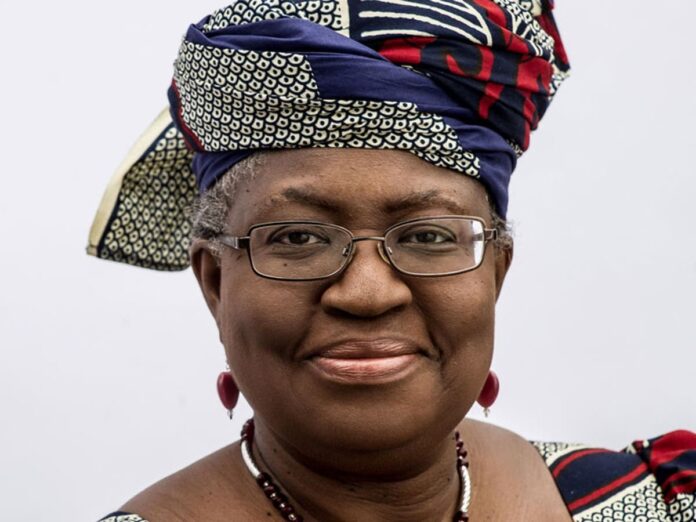So much has been said and written about the person of Dr (Mrs) Ngozi Okonjo-Iweala. She is one of the most popular women in Africa today and there are good reasons for that. This is not just due to her previous political appointments as two-time Minister of Finance and one-time Minister of Foreign Affairs of the largest and most populous black nation on earth, and we cannot equally say this is only because of her record as the Managing Director of the World Bank. Having followed Dr Okonjo-Iweala’s activities since 2004 when she was heading Nigeria’s Ministry of Finance, I have come to observe she has always been bold to take up the toughest of jobs, tasks and implement the seemingly most difficult reforms – with effortless ease. I thought it was only me observing this till I was recently proved wrong.
At this point, let me invite Mr Gordon Brown into the discussion. For some reasons, some of us may not know Mr Brown. Mr Brown is a British Statesman and public figure who served as Prime Minister from 2007 to 2010. Aside from this, Mr Brown is a well-known friend of Africa (Nigeria especially). This explains why Mr Brown was among the first set of endorsements for Dr Okonjo-Iweala for the position of Director-General of the World Trade Organization (WTO) sometime in July.
The British newspaper, The Times, captures it properly with the bold headline GORDON BROWN BACKS OKONJO-IWEALA TO LEAD WTO. This endorsement means a lot. First, having served as UK Prime Minister at the time Okonjo-Iweala was Nigeria’s Finance Minister, Mr Brown knows her competence in implementing tough reforms and handling complex development and budgeting challenges in a unique environment like Nigeria. As I said earlier, Mr Brown is not a stranger to Africa’s murky socio-political environment and what it takes to implement reforms in payroll and pensions management.
Quoting The Times, the former Prime Minister said that Okonjo-Iweala would make an “outstanding success” of running the Geneva-based organization which is currently facing some fundamental crises and in search of its soul. Gordon Brown surely knows too well that the choice of the next DG of the organization is very crucial as the world grapples with the global economic disruption caused by Covid-19.
Secondly, Brown’s backing of Okoko-Iweala is altruistic. By endorsing Okonjo-Iweala, Brown allowed himself to be guided by the spirit of competence rather than nationalistic milieu and innuendos. He is well aware that Mr Liam Fox, his compatriot who previously served as UK Secretary of Trade is in the race with Okonjo-Iweala. Even at that, Mr Brown does not seem rightly persuaded by ultra-nationalist arguments before endorsing the amazon from Nigeria. According to Brown, Okonjo-Iweala is well-respected “across the whole of the world”.
I understand some people may want to bring in British party politics into this matter at this point. “Oh, Gordon Brown won’t endorse Liam Fox because of his Labour affiliation” or similar arguments. This, to be honest, is either ridiculous or petty. As bitter as Nigerian politics can be, politicians of all orientations have endorsed Okonjo-Iweala. Even though she served under the government of the opposition party, the current government still went ahead to nominate and support her for the position. The reason for this is straightforward: she is perceived as competent irrespective of her political orientations or affiliations. If competence is what is required, then Okonjo-Iweala is the one the cap fits.
Earlier in July, Mr Patrick Lumumba, a Kenyan lawyer and global anti-corruption crusader, bypassed his fellow Kenyan, Amina Muhammed, to endorse Okonjo-Iweala. In Lumumba’s own words, he said: “Right now …Okonjo-Iweala is the candidate we should back, given her credentials.” (Italics mine). Notice, Lumumba never bothered about Okonjo-Iweala’s country of origin. He is also not moved about the argument that his own country has a candidate for the same position Ngozi is running for. What he bothers about is who is most qualified for the job. All other things are details.
This leads me to Mr Brown’s striking evaluation of Okonjo-Iweala: she handles the toughest of jobs. Dr Okojo-Iweala has become adept at handling and delivering on seemingly complicated tasks and implementing life-threatening institutional reforms in fast-paced settings. She has mastered the art of making seemingly difficult problems look simple with the ways she handles them. Nobody ever thought it was possible to build a centralized database for payroll for public sector workers in Nigeria until Okonjo-Iweala came. Nobody thought it was going to be easy negotiating debt relief for Nigerian until Okonjo-Iweala made it possible in 2005.
Many Nigerians now take the benefits of Banking Reforms for granted but do not know it started while Okonjo-Iweala was Finance Minister. The current pension system in operation in Nigeria today came through the table of Madam Okonjo-Iweala. What about the use of technology to fight corruption in the public sector? Many people seem to forget that existing initiatives like the Treasury Single Account (TSA) and Integrated Personnel Payroll Identification System (IPPIS) which have saved the Nigerian government huge sums of dollars are the initiatives of Dr Okonjo-Iweala. Also, her foresight in making Nigeria learn how to save for the rainy days led to her to initiate the Sovereign Wealth Funds (SWF) to cushion the effects of fluctuations in the international oil market and stabilize domestic prices.
These are not easy reforms to implement in any way. These are some of the though jobs handlined by this brilliant woman. These are legacy projects. No wonder Gordon Brown bypassed his compatriot to endorse her!
With more of her rivals’ compatriots endorsing Okonjo-Iweala, the world is beginning to see politics differently. This time, it’s about giving the job to the person who knows how to do it the best. That person is Ngozi Okonjo-Iweala. I stand with Gordon Brown!
Olalekan Adigun, a public affairs commentator, writes from Lagos. He tweets from @MrLekanAdigun







